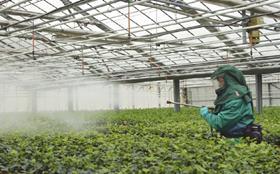
A study has concluded that the passing of new legislation currently being tabled by the European Commission on pesticides in the European Union (EU) could see the prices of key crops rise by more than 70 per cent in the future.
The report, released by the European Centre for Agricultural, Regional and Environmental Policy Research (EuroCARE), said that the legislation will drastically reduce the pest management options available to European farmers resulting in a steep drop in yields.
Crops such as wheat and potato could endure price increases of up to 20 per cent in Europe, the report added, with the EU potentially becoming a net importer of these crops. In the worst-case scenario, prices for cereals and vegetables could rise by 73 per cent and 104 per cent respectively, the EuroCARE study said.
'These increases are not surprising given the current pressures on food prices and the importance of the EU to international markets,' said EuroCARE's Marcel Adenaeuer. 'The price increases forecasted in the study were also in line with recent experience.'
The new legislation, which will replace Directive 91/414/EEC, will see 'cut-off criteria' imposed on certain chemical substances, prohibiting their use in the EU. Those in favour of the move say that this is the safest way to ensure that potentially harmful substance are kept out of produce.
However many bodies, including the European Crop Protection Association (ECPA), have spoken out against the move, saying that the legislation is being introduced without an independent impact assessment. This assessment would examine not only the potential dangers of substances individually but their likely risk to people in pesticide form, which could be minimal or negligible in certain cases, the ECPA has said.
Friedhelm Schmider, director general at the ECPA, has also highlighted the impact that banning the substances will have on crop production in Europe.
'All crops need protection from disease and pests. If you remove the tools farmers use to protect their crops, yields will go down - and prices will go up,' he said. 'This research proves that banning pest management options will, in the end, hit consumers in the pocket.
'Given the findings of the EuroCARE study, the European Crop Protection Association is calling for the European Parliament and Commission to request an independent comprehensive impact assessment on the proposed pest management restriction criteria from the European Food Safety Authority,' Mr Schmider added. 'Europe is the world's top producer and top exporter of food, an achievement which is built upon a foundation of effective pest management. Banning the tools without proper scientific consideration is fraught with risk.'



